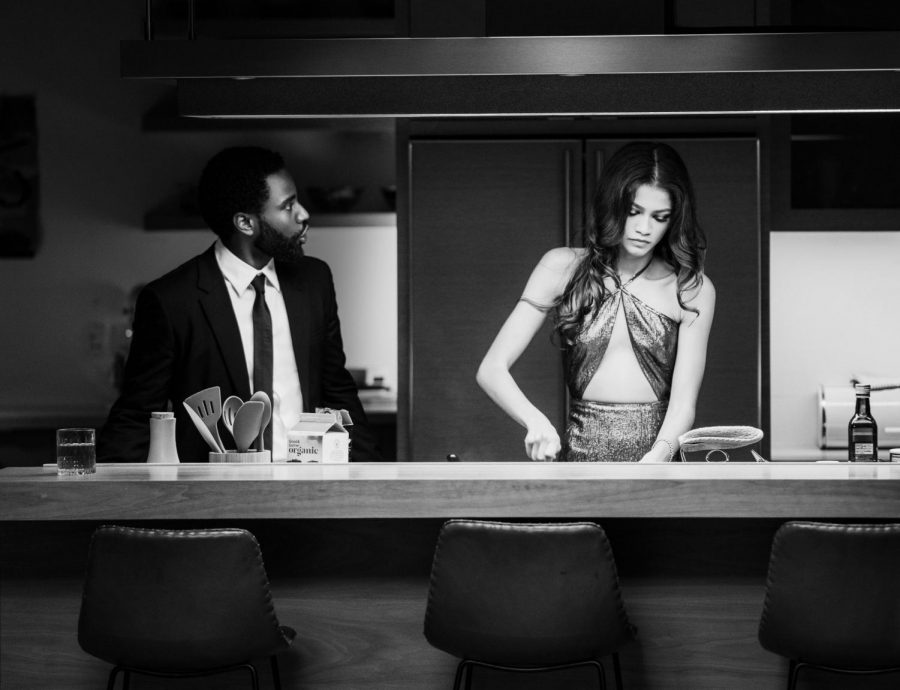REVIEW: ‘Malcolm & Marie’ dresses emotional terrorism in black and white
It’s not a romance
John David Washington and Zendaya play an arguing couple in “Malcolm & Marie.” The relationship’s 12-year age gap garnered a lot of criticism recently, a trope typically found in Hollywood. Photo courtesy of Netflix, Inc.
February 12, 2021
Malcolm, portrayed by John David Washington, is riding the high of returning from his movie’s premiere night. The Netflix film’s beginning sequence is enough to intrigue you with its fluid camera movement, framing its characters to appear as if they were on stage. It’s mesmerizing to watch as the movie only follows a couple arguing in one large, remote home resembling the isolation we all found ourselves in currently.
“Malcolm & Marie” is quite literally a product of the pandemic. The 35mm black and white film was shot at the beginning of lockdown last year with a crew of only 22 people who quarantined together to create the film.
Story continues below video.
It’s hard to say if this film accomplished what it was attempting to depict: a turbulent love story.
The entire film is one hour and 46 minutes of pretentiousness, gaslighting, emotional abuse and manipulation. Emmy award winner Zendaya’s character, Marie, indulges her overexuberent filmmaker boyfriend as he goes on long-winded rants about film critics and criticism in the early morning.
It is vividly entertaining to watch Washington display some new acting range, but the monologues interrupt what works best in the film: the back-and-forth dialogue he shares with Zendaya. Unfortunately, it’s the script’s lack of structure that makes all the film’s points feel moot by the end.
For example, at one point Malcolm complains that white critics use “identity politics” to categorize BIPOC filmmakers’ work. The delivery of the line feels odd when you remember the line was written by a white cis man whose father is already a famous director. Not only that, but the obnoxious dialogue is loaded with incomprehensible jargon that succeeds in losing its audience rather than encaptivating them.
Seriously, no one uses “gravitas” or “lo and behold” casually in the heat of the moment.
RELATED: REVIEW: Don’t try to understand ‘Tenet’ — just feel it
“Malcolm & Marie” continued to lose its spark the more the film distanced itself from actually tackling why Marie was indeed being used as Malcolm’s muse.
I watched the film only interested in the performances that John David Washington and Zendaya were going to deliver. The director Sam Levinson is well known for his 2018 film “Assasination Nation” and the HBO series “Euphoria” starring Zendaya as well.
Both pieces of work have an obscene amount of oversexualized graphic content with teenage main characters in the center. Both also have eerily similar scenes where his promiscuous characters, with “whore” stereotypes, get aggressively humiliated and degraded for expressing their sexual liberty.
While I am still waiting for season two of “Euphoria,” it is also impossible to ignore the fact that Levinson has a pattern of aggressively demeaning his female characters.
“Malcolm & Marie” unfortunately falls into the familiar trap.
Although Zendaya has earned her big screen credits with the 2017 musical “The Greatest Showman” and her role as MJ in Marvel’s “Spider-Man” franchise, she has only been granted limited screen time in this film. Zendaya is a natural powerhouse in this film as one of the leads and her performance more than proves her capability to take on more.
RELATED: OPINION: Best films of 2020
It’s an exhausting watch, and you’ll most likely be drained by the end of it, but there are a few rare tender moments that allow the film to breathe in between explosive discussions. Soulful jazz music fills in the gaps of silence along with the music of James Brown and Dionne Warwick that solidify the laid-back tone of the film.
Zendaya is especially phenomenal in those quieter moments where she really embodies a young, resentful woman who is seriously contemplating her worth in the relationship. The eye level framing that lingers tightly on the actors does well in heightening the emotional agony the characters are experiencing.
It’s physically exhausting to watch the drama unfold on screen, but the cinematographer Marcell Rév creates a hypnotizing cinematic experience nevertheless. The backlighting came out exceptionally well in all of the outside scenes that create a stunning background. While the heteronormativity becomes too suffocating, you can always rely on Rév’s talent to create a visually aesthetic film.
Kraft’s macaroni and cheese has never looked so appealing, and Rév was able to pull that off, which is a feat in itself in my opinion.




































































































































